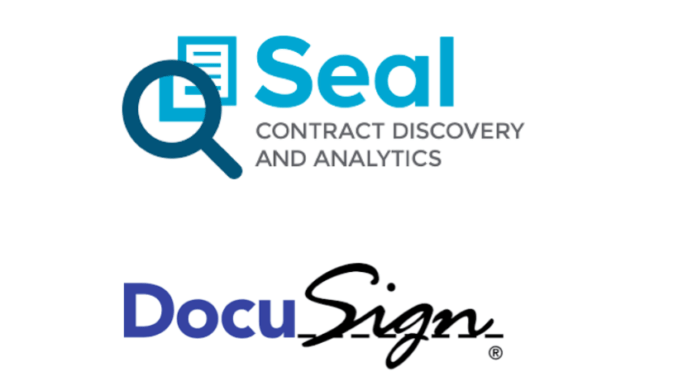
Digital signature giant, DocuSign, has launched an Ethereum blockchain integration and has also set out in detail how it will be working with legal AI company, Seal Software, with which it formed a partnership in June this year. The announcements are part of its Fall ’18 Release.
The company will now offer clients what it is branding as ‘Intelligent Insights’, powered by Seal Software and which it says ‘goes beyond keywords to ‘understand’ concepts in agreement clauses, as a human analyst would’.
For example, it would recognise that a clause about Internet cookies was related to privacy, even if the word ‘privacy’ was absent, the company noted.
The same technology can automatically classify and compare how different agreements handle various topics, so customers can spot anomalies, risks and opportunities quickly, they said.
DocuSign will also be adding Seal’s GDPR Compliance Pack to the client offering, designed to help companies meet the European Union’s GDPR regulations, by analysing agreements for risk and exposure.
This roll out of Seal’s NLP/ML tech on such a massively popular signature platform should certainly help broaden the use of the AI company’s tech and introduce new clients to AI review that are already using DocuSign.
DocuSign has over 400,000 paying customers (many of which are very large businesses, such as banks and global law firms), giving the company in turn what it says are ‘hundreds of millions of individual users’ around the world.
The company is also launching an ability to verify signatures and the ‘integrity’ of any DocuSigned document via a pre-built integration with the Ethereum blockchain.
Ron Hirson, chief product officer at DocuSign, said: ‘For customers that opt in, DocuSign will compute a one-way cryptographic hash fingerprint for every completed transaction, and write the value to the Ethereum blockchain, the most popular blockchain for smart contracts in our view.’
‘This hash acts as tamper-proof evidence for the transaction, and enables any completed document to be validated independently. And by using the Ethereum blockchain, that third party evidence for a transaction is accessible to anyone,’ he added.
The move is further testament to the normalisation of blockchain tech with a legal dimension, which has moved forward at surprising speed in the last few weeks.
We have gone from cynics saying there are ‘no use cases for blockchain’ to a raft of major companies adopting the tech, for everything from blockchain IDs, as seen in this case, to moving forward with the use of smart contracts, as seen with OpenLaw and Rocket Lawyer most recently.